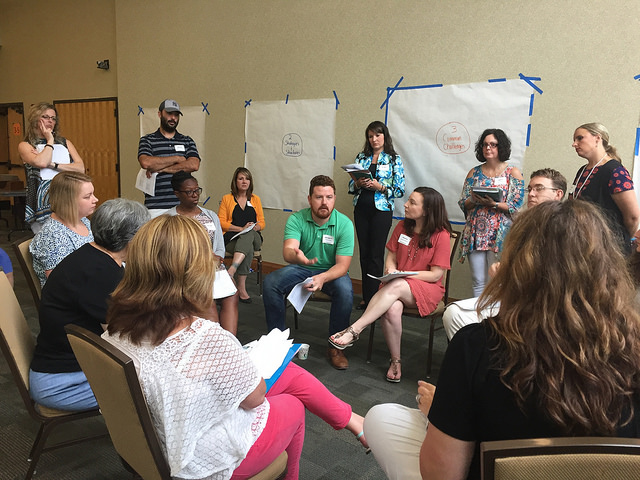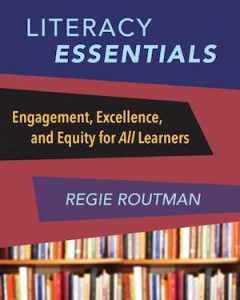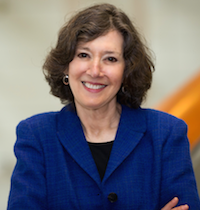Regie Routman is a longtime teacher, leader, author and storyteller. Her latest book, Literacy Essentials: Engagement, Excellence, and Equity for All Learners (Stenhouse 2018) distills the knowledge she has gained from decades of work with teachers and students, including many in high-challenge schools. Our thanks to her for sharing this excerpt on the importance of teaching with intentionality and making no assumptions without evidence. Also see her first excerpt, on “frontloading” learning.
Without highly intentional planning and frontloading, even when our teaching is effective results will be limited in terms of student success, achievement, and independence.
By intentional, I mean that both teachers and students are very clear about desired learning outcomes and that those outcomes propel students forward as readers, writers, and thinkers in meaningful ways.
Although it is essential to clearly state and make visible our content and language goals and objectives—and check that our students know and understand them—those goals and objectives must be worthwhile ones and lead to empowering students as literacy learners beyond the lesson.
Just because we post our learning targets each day and students can say what these are doesn’t mean the work is worth doing. Being intentional also means being deliberately mindful in the act of teaching and changing course as needed.
Deepening a kindergarten literacy lesson
Here’s an example of what I’m talking about from a school where literacy beliefs were in transition. An observation of a strong kindergarten teacher showed that her lesson focus was on writing a book that recalled a recent class field trip to a farm. After the demonstration and frontloading, each of the students would be expected to write their own similar book.
 With the students seated in front of her on the floor, she told them, “Our goal is planning our book about our trip to the farm. What will we need in our book?”
With the students seated in front of her on the floor, she told them, “Our goal is planning our book about our trip to the farm. What will we need in our book?”
She then drew four pictures in four quadrants on a large sheet of chart paper to recall four key happenings. She did an excellent job asking questions and soliciting responses for the pictures and for words to go along with the pictures to make a complete story. But as my esteemed colleague Sandra Figueroa wisely says, “Our focus needs to be on learning, not just doing.”
Although the activity engaged the children and was worthwhile, by not being fully intentional about how the activity could potentially increase their skills and competencies as readers and writers, the learning was limited.
Being more intentional about literacy learning, the teacher could also do the following:
► Create an authentic audience and purpose for the writing. (Move the audience beyond the teacher.)
► Make the print large enough for all students to see. (Her small print indicated that it was not meant to be read/seen by all students, even if the teacher intended it to be read.)
► Reread and point to each word while reading. (By not pointing to each word and not sliding her finger under each word as she read, she lost a shared-reading that can be highly supportive to emerging readers.)
► Promote oral language and hearing all the voices through “turn and talk.” (The teacher did almost all the talking and deciding—that is, she was “telling teaching,” which research shows does not lead to optimal achievement.)
► Focus on reading-writing connections. (There was no attempt to connect writing with reading. However, by saying something like “Writers write for readers, so our pictures and words have to match” and “Reread your story so it makes sense for your reader,” even our youngest students can grasp this essential connection.)
The shift from better to best
It would not take much to move this teacher from strong to expert. In fact, after celebrating the terrific teaching she had done and asking her if she’d like any suggestions (she said she would), making her aware of these bulleted factors was enough to make her rethink her lesson.
She realized that an audience for the writing beyond herself would drive students to do their best writing; pointing to words that all students could see as she read aloud and inviting students to read with her would increase their reading abilities and confidence; time to talk with peers could add richer language and more voices to the writing; and connecting reading and writing would benefit both processes—for example, using the text at a later date for word work.
Take action
► Focus on the learning and ensure the process increases knowledge and understanding as well as mindfulness of what is not yet known. Ask the following:
- What is it that we want students to learn?
- What are the important learning outcomes that will result from this lesson or study?
- Will what we are expecting students to do maximize opportunities for worthwhile reading, writing, conversing, and critical thinking?
- How will this activity or study make students more capable, joyful, and independent as literacy learners and thinkers?
- How will we know what students have learned? How will students demonstrate their learning?
- What are our next steps for clarifying, sustaining, or increasing student understanding?
- Have we thoughtfully considered how we are best using the time we have?
► Assess first what students know and need to know. “Too often we fail to teach with intentionality because we do not have a sense of what our students know. As well, we wind up participating in professional learning opportunities that simply waste our time because we do not know what we need to learn to move our students forward.” (Matthew Vaughn-Smith)
 ► Make curricular outcomes accessible. Ensure that lesson plans and goals are student friendly, attainable, and measurable, which is especially critical for students who struggle. Use multiple modalities—see it, say it, do it—to ensure all students have comprehensible input and understand what they are to learn and why they are learning it.
► Make curricular outcomes accessible. Ensure that lesson plans and goals are student friendly, attainable, and measurable, which is especially critical for students who struggle. Use multiple modalities—see it, say it, do it—to ensure all students have comprehensible input and understand what they are to learn and why they are learning it.
► Seek out colleagues who get great results. A school culture of mentors—that is, expert teachers who are intentional and highly effective—is a necessity for schoolwide achievement. Savvy principals find ways to provide support—such as occasionally hiring a roving sub or taking a teacher’s classroom for an hour—so that mentors and mentees (often they can be both) can observe and collaborate in either of their classrooms.
► Be more intentional about data. Do everything possible to ensure data collection and analysis is meaningful, balanced, fair, useful, and manageable. Often data use can be overwhelming for staff, leading to more testing, intervention, too much focus on data walls, and obsession with numbers. The first priority for data use must be improving student learning through improved and responsive instructional practices.
Make no assumptions
I have often taken for granted that students have enough background knowledge and experience to know the basic vocabulary needed to understand a read-aloud book, a guided-reading book, or a self-selected book. Then a student will raise his hand and ask, “What does [that word] mean?” Often it is a fundamental word, such as disappointment or energy.
Time and time again, we assume that students—and teachers—have general knowledge and experiences about the world or instruction when they do not. For example, almost every time I begin a residency in a new school, the principal and teachers will say something like, “We’ve had lots of professional development, and we’re very ‘far along.’” In the past, I assumed the staff was knowledgeable, but I have learned that much professional development is fragmented and superficial, and that we cannot assume anything about what educators do and do not know.
“Make no assumptions” also applies to any set of standards we adopt. Even the “best” set of standards or curriculum requires that we educators know how to apply them—no easy matter. We cannot assume that schools and districts will be able to figure out how to implement standards so students learn more. In fact, successful implementation has proved to be a stumbling block for many.
Finally, “make no assumptions” applies to us as educators and colleagues. We cannot take for granted that our demonstrations are sufficient, that the terms we are using are commonly understood, that the support we are providing is helpful, or that the learning environment is a comfortable and positive one for all who inhabit it.
Always we need to be responsively assessing all that we do and be willing to respectfully adjust our language, goals, methods, instruction, and assessment to maximize success for all.
 Regie Routman currently works onsite through a residency model in diverse schools and districts – coaching and mentoring principals, leaders at all levels, and teachers. She demonstrates effective instructional and assessment practices with the goal of creating and sustaining effective, intellectual, joyful cultures where all learners thrive as readers, writers, and responsible citizens.
Regie Routman currently works onsite through a residency model in diverse schools and districts – coaching and mentoring principals, leaders at all levels, and teachers. She demonstrates effective instructional and assessment practices with the goal of creating and sustaining effective, intellectual, joyful cultures where all learners thrive as readers, writers, and responsible citizens.
In addition to Literacy Essentials (browse the complete text at the Stenhouse site), Regie is the author of Reading Essentials, Writing Essentials, and Teaching Essentials. Visit regieroutman.org for more information on her many books, resources, blogs, professional offerings, and contact information.



0 Comments on "Regie Routman: Teach with Intention and Make No Assumptions"